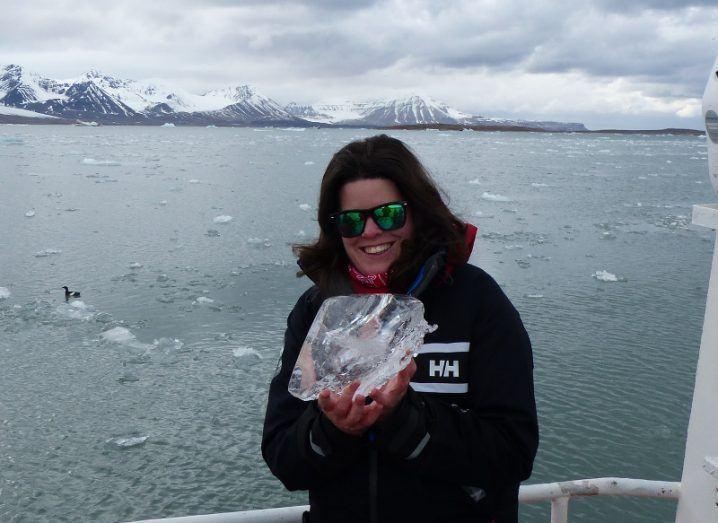
DCU researcher senses marine change in extreme conditions
The whole world’s a lab for DCU researcher Dr Margaret McCaul, who is working on sensor technologies for marine environments. Claire O’Connell reports.
If you think being a scientist automatically means spending your days (and evenings) inside in a lab, think again.
For Dr Margaret McCaul, her research on marine sensor technology has seen her tackle Mediterranean storms, Arctic ice and even the threat of volcanoes and polar bears – but the result should be technology to help protect the marine environment.
McCaul is a postdoctoral researcher at Dublin City University (DCU), where she works on the EU-funded COMMONSENSE project, which is developing a sensor network that can monitor marine environments and pick up changes in levels of polluting chemicals, acidity, microplastics and noise.
“In 2020, all EU member states will need to have cost-effective sensors to monitor these factors,” said McCaul, who works with Prof Dermot Diamond at theNational Centre for Sensor Research and the Insight Centre for Data Analytics.
She is particularly interested in detecting the over-enrichment of marine waters with chemicals such as nitrates, nitrites and phosphates that can run off from natural processes, agriculture and factories. If this happens, it sows the seeds for algal blooms that potentially damage tourism and fisheries.
Testing, volcanoes and bears – oh my!
It’s all very well getting the sensors working in a lab, but they need to prove they can function at sea, and that’s why McCaul and colleagues set off around the Mediterranean on a ‘cruise’ with the national research council of Italy.
This was no leisure trip. The team spent weeks sampling waters from the sea around Naples, Sardinia and Sicily and testing out the sensor technology under real-world conditions that were often testing for the humans, too.
“It was tough going,” recalled McCaul. “There were swells about 2m high. We had to shelter from a storm for three days and Mount Etna erupted about two days after we were below it.”
This wasn’t the only challenging environment where McCaul put the sensors through their paces. The project also deployed the technology in the Arctic.
“The sensors are adaptable, and we wanted to test them in these extreme conditions,” she said. “We deployed them in a fjord around glaciers and we could see the difference from the melt and freshwater coming in.”
Equipment from the DCU research team in the Arctic. Photo via Simon Escalle
Not only did the researchers brave the cold, they also had to undergo training in case they encountered polar bears. In the end, though, the bears – like Mount Etna – held off until the team had moved on. “We saw polar bear footprints there, and they were at the site a couple of days after we left.”
From Limerick to the world
Limerick native McCaul took an early shine to science at school and studied at Limerick Institute of Technology before working in industry, including a spell in equine forensics where she analysed samples from race horses to test for drugs.
When the opportunity to do a PhD came up in DCU, she jumped in, and now enjoys spreading the word to school students about how science is not all about being in a lab.
Dr Margaret McCaul in an Arctic ‘lab’. Photo via Simon Escalle
Sea-ing the big picture
McCaul’s fieldwork continues – just this week she was deploying sensors in Dublin Bay, and the finale of the COMMONSENSE project will see all the sensors deployed together in Sardinia to gather information about noise, plastics, pollution and over-enrichment.
Ultimately, she hopes the sensor network technology will help to build a bigger picture of marine change as well as identifying incidences of pollution.
“We can deploy and then take samples every hour and it is cost-effective,” she explained. “They can used on boat or deployed off marina or pontoon and adapted to that area, and the more sensors you develop at that cost the more you can put them out and get a bigger picture of what is happening in the sea.”
IN-DEPTH: WOMEN INVENT
RELATED: SENSORS, RESEARCH, DCU, LIMERICK IT, WOMEN INVENT, MARINE LIFE, INSIGHT CENTRE FOR DATA ANALYTICS
Silicon Republic article
